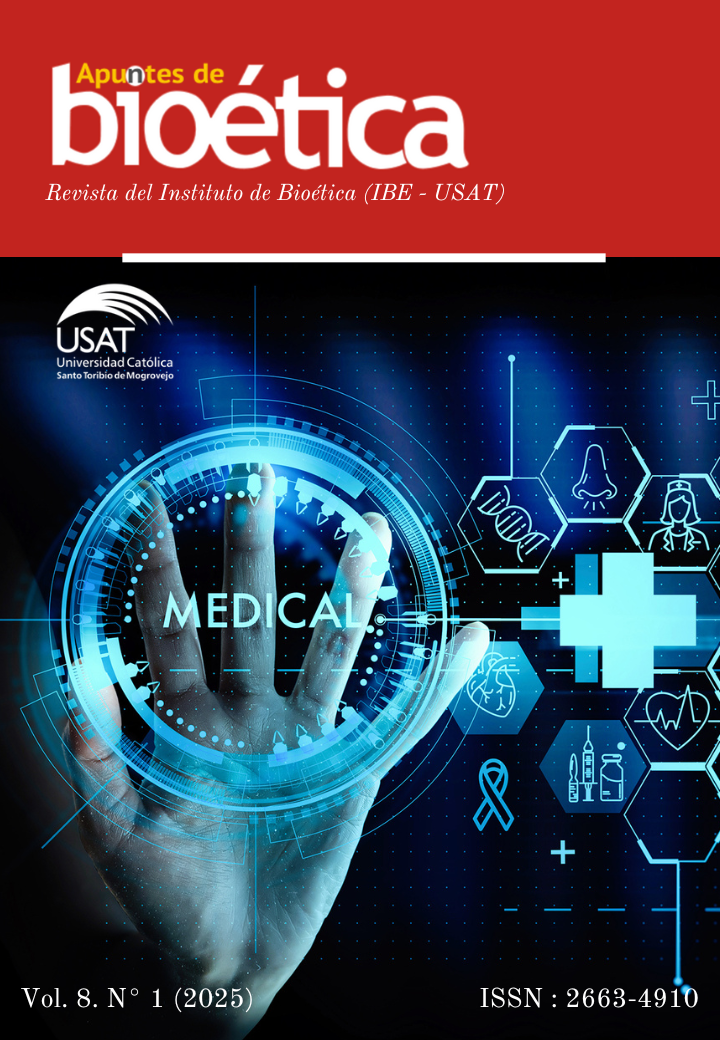Integración de la humanización en la formación de profesionales de salud a través de la simulación clínica
Una revisión de la literatura
Resumen
La automatización y estandarización en la atención de salud han generado preocupaciones sobre la deshumanización, afectando la confianza del paciente y el bienestar profesional. La humanización, que integra el enfoque técnico con el reconocimiento de la dignidad del paciente, es una prioridad en la formación en salud. En este contexto, la simulación clínica se ha consolidado como una herramienta pedagógica efectiva para desarrollar la empatía, la comunicación y otras competencias humanísticas en los estudiantes de profesiones sanitarias.
Esta revisión analiza la literatura sobre el uso de la simulación como herramienta para enseñar la humanización en salud, identificando estrategias clave y evaluando su impacto. Los hallazgos destacan que la inclusión de pacientes estandarizados, escenarios realistas y debriefing reflexivo mejoran la capacidad de los estudiantes para brindar atención centrada en la persona.
A pesar de que la simulación ha demostrado ser eficaz en la enseñanza de la empatía y la comunicación, aún persisten brechas en los estudios sobre su impacto a largo plazo y su aplicación en distintas disciplinas. Se recomienda integrar la humanización en los currículos de simulación y desarrollar métodos de evaluación estandarizados. Fomentar una cultura educativa centrada en la humanización es esencial para mejorar la calidad de la atención y la satisfacción de pacientes y profesionales.
Descargas
Citas
Alconero‐Camarero, A. R., Sarabia‐Cobo, C. M., Catalán-Piris, M. J., González‐Gómez, S. & González‐López, J. R. (2021). Nursing Students’ Satisfaction: A Comparison between Medium- and High-Fidelity Simulation Training. International Journal of Environmental Research and Public Health, 18(2), 804. https://doi.org/10.3390/ijerph18020804
Archer, E. & Meyer, I. S. (2021). Applying empathic communication skills in clinical practice: Medical students’ experiences. South African Family Practice, 63(1), a5244. https://doi.org/10.4102/safp.v63i1.5244
Ayaz, O. & Ismail, F. W. (2022). Healthcare Simulation: A Key to the Future of Medical Education – A Review. Advances in Medical Education and Practice, 13, 301-308. https://doi.org/10.2147/amep.s353777
Armijo-Rivera, S., Behrens-Pérez, C., Reyes-Aramburu, E. P., Pérez- Villalobos, C. & Bastías-Vega, N. (2020). Aportes de la simulación al desarrollo del razonamiento clínico en estudiantes de pregrado de medicina. Revista Latinoamericana de Simulación Clínica, 2(1), 19-25. https://doi.org/10.35366/92935
Beyea, S. C. & Kobokovich, L. J. (2004). Human patient simulation: A teaching strategy. AORN Journal, 80(4), 738-741. https://doi.org/10.1016/s0001-2092(06)61329-x
Cant, R. & Cooper, S. (2017). Use of simulation-based learning in undergraduate nurse education: An umbrella systematic review. Nurse Education Today, 49, 63-71. https://doi.org/10.1016/j.nedt.2016.11.015
Cohen, L. & Sherif, Y. A. (2014). Twelve tips on teaching and learning humanism in medical education. Medical Teacher, 36(8), 680-684. https://doi.org/10.3109/0142159x.2014.916779
Monti, L. M., dos Santos, J. C., Del´Angelo, N., Villela, J., Natália, A., Dias, V. R. & Negrão, R. C. (2020). Interdisciplinary simulation scenario in nursing education: Humanized childbirth and birth. Rev. Latino-Am. Enfermagem, 28(e3286), 1-10. http://dx.doi.org/10.1590/1518-8345.3681.3286
Gaba, D. M. (2007). The future vision of simulation in healthcare. Simulation in healthcare: journal of the Society for Simulation in Healthcare, 2(2), 126–135. https://doi.org/10.1097/01.SIH.0000258411.38212.32
González, J. M., Chaves, J., Ocete, E. & Calvo, C. (2008). Nuevas metodologías en el entrenamiento de emergencias pediátricas: simulación médica aplicada a pediatría. Anales de Pediatría, 68(6), 612-620. https://doi.org/10.1157/13123296
Gonzalez-Moreno, M., Andrade-Pino, P., Monfort-Vinuesa, C., Piñas-Mesa, A. & Rincon, E. (2023). Improving Humanization through Metaverse-Related Technologies: A Systematic Review. Electronics, 12(1727), 1-15. https://doi.org/10.3390/electronics12071727
Guetterman, T. C., Sakakibara, R., Baireddy, S., Kron, F. W., Scerbo, M. W., Cleary, J. F. & Fetters, M. D. (2019). Medical Students' Experiences and Outcomes Using a Virtual Human Simulation to Improve Communication Skills: Mixed Methods Study. Journal of medical Internet research, 21(11), e15459. https://doi.org/10.2196/15459
Herrera-Aliaga, E. & Estrada, L. D. (2022). Trends and Innovations of Simulation for Twenty First Century Medical Education. Frontiers in Public Health, 10, 1-7. https://doi.org/10.3389/fpubh.2022.619769
Holland, T. (2022). Educational Strategies to Foster Empathy Utilizing Simulation Pedagogy. International Journal of Caring Sciences, 13(3), 1589-1595. https://www.internationaljournalofcaringsciences.org/docs/7_holland_original_13_3.pdf
Hoogendoorn, C. J. & Rodríguez, N. D. (2023). Rethinking dehumanization, empathy, and burnout in healthcare context. Current opinion in behavioral sciences, 52. https://doi.org/10.1016/j.cobeha.2023.101285
Jang, G. & Dahlke, S. (2024). Empathy and High-Fidelity Human Patient Simulators: A Critical Analysis of Undergraduate Nursing Education. Quality Advancement in Nursing Education - Avancées en formation infirmière, 10(3), 1-13. https://doi.org/10.17483/2368-6669.1468
Jiménez‐Rodríguez, D., Pérez-Heredia, M., Molero, M. D. M., Pérez-Fuentes, M. D. C. & Arrogante, O. (2021). Improving Humanization Skills through Simulation-Based Computers Using Simulated Nursing Video Consultations. Healthcare, 10(1), 1-9. https://doi.org/10.3390/healthcare10010037
Koukourikos, K., Tsaloglidou, A., Kourkouta, L., Papathanasiou, I. V., Iliadis, C., Fratzana, A. & Panagiotou, A. (2021). Simulation in Clinical Nursing Education. Acta informatica medica, 29(1), 15–20. https://doi.org/10.5455/aim.2021.29.15-20
Lamé, G. & Dixon-Woods, M. (2020). Using clinical simulation to study how to improve quality and safety in healthcare. BMJ simulation & technology enhanced learning, 6(2), 87–94. https://doi.org/10.1136/bmjstel-2018-000370
Létourneau, D., Goudreau, J. & Cara, C. (2021). Nursing Students and Nurses’ Recommendations Aiming at Improving the Development of the Humanistic Caring Competency. Canadian Journal of Nursing Research, 54(3), 292-303. https://doi.org/10.1177/08445621211048987
Levett-Jones, T., Cant, R. & Lapkin, S. (2019). A systematic review of the effectiveness of empathy education for undergraduate nursing students. Nurse education today, 75, 80–94. https://doi.org/10.1016/j.nedt.2019.01.006
Liaw, S. Y., Tan, J. Z., Lim, S., Zhou, W., Yap, J., Ratan, R., Ooi, S. L., Wong, S. J., Seah, B. & Chua, W. L. (2023). Artificial intelligence in virtual reality simulation for interprofessional communication training: Mixed method study. Nurse education today, 122, 105718. https://doi.org/10.1016/j.nedt.2023.105718
Lioce, L., Meakim, C. H., Fey, M. K., Chmil, J. V., Mariani, B. & Alinier, G. (2015). Standards of Best Practice: Simulation Standard IX: Simulation Design. Clinical Simulation in Nursing, 11(6), 309-315. https://doi.org/10.1016/j.ecns.2015.03.005
Martínez-Arce, A., Bermejo-Cantarero, A., Muñoz de Morales-Romero, L., Baladrón-González, V., Bejarano-Ramírez, N., Verdugo-Moreno, G., Montero-Gaspar, M. A. & Redondo-Calvo, F. J. (2024). Clinical Simulation Program for the Training of Health Profession Residents in Confidentiality and the Use of Social Networks. Nursing reports, 14(4), 3040–3051. https://doi.org/10.3390/nursrep14040221
Matharu, E., Jegard, J., Hague, S., Roj, B. & Kaneshamoorthy, M. (2025). 2846 How can simulation training be used to teach skills in human factors (HF)? Age and Ageing, 54(1), 277-287. https://doi.org/10.1093/ageing/afae277.087
Mehta, A., Adams, N., Fredrickson, M., Kraszkiewicz, W., Siy, J., Hamel, L. & Hendel-Paterson, B. (2021). Craving Empathy: Studying the Sustained Impact of Empathy Training on Clinicians. Journal of patient experience, 8, 1-8. https://doi.org/10.1177/23743735211043383
Palnati, M., Martinez, A. E., Audil, A., Tovar, E., Macfarlane, P., Gerber, M. & Wagner, K. (2024). Simulation-Based Trauma-Informed Care Education Instills Empathy and Improves Clinician Practices Towards Refugee and Migrant Populations. MedEdPORTAL: the journal of teaching and learning resources, 20, 11475. https://doi.org/10.15766/mep_2374-8265.11475
Penalo, L. M. (2023). Effects of the Virtual Simulation Prebriefing-Debriefing Educational Strategy on Nursing Students’ Self-Efficacy and Virtual Simulation Performance: A Quasi-Experimental Study. Clinical Simulation in Nursing, 82. https://doi.org/10.1016/j.ecns.2023.101431
Pérez-Fuentes, M. D. C., Herrera-Peco, I., Molero, M. D. M., Oropesa, N. F., Ayuso-Murillo, D. & Gázquez, J. J. (2019). The Development and Validation of the Healthcare Professional Humanization Scale (HUMAS) for Nursing. International journal of environmental research and public health, 16(20), 3999. https://doi.org/10.3390/ijerph16203999
Reedy, G., Lavelle, M., Simpson, T. & Anderson, J. (2017). Development of the Human Factors Skills for Healthcare Instrument: a valid and reliable tool for assessing interprofessional learning across healthcare practice settings. BMJ Simulation & Technology Enhanced Learning, 3(4), 135-141. https://doi.org/10.1136/bmjstel-2016-000159
Reyes-Téllez, Á., González‐García, A., Martín-Salvador, A., Gázquez-López, M., Martínez-García, E. & García-García, I. G. (2024). Humanization of nursing care: a systematic review [Review of Humanization of nursing care: a systematic review]. Frontiers in Medicine, 1-13. https://doi.org/10.3389/fmed.2024.1446701
Schweller, M., Costa, F. O., Antônio, M. Â., Amaral, E. M. & de Carvalho-Filho, M. A. (2014). The impact of simulated medical consultations on the empathy levels of students at one medical school. Academic medicine: journal of the Association of American Medical Colleges, 89(4), 632–637. https://doi.org/10.1097/ACM.0000000000000175
Son, D., Shimizu, I., Ishikawa, H., Aomatsu, M. & Leppink, J. (2018). Communication skills training and the conceptual structure of empathy among medical students. Perspectives on Medical Education, 7(4), 264-271. https://doi.org/10.1007/s40037-018-0431-z
Švab, I. & Cerovečki, V. (2024). Person-centred care, a core concept of family medicine. European Journal of General Practice, 30(1). https://doi.org/10.1080/13814788.2024.2393860
Ton, D. N. M., Duong, T. T. K., Tran, H. T., Nguyen, T. T., Ba, H. M., Nguyen, P. T. A., Ho, B. D. & Trang, H. T. T. (2024). Effects of Standardized Patient Simulation and Mobile Applications on Nursing Students’ Clinical Competence, Self-Efficacy, and Cultural Competence: A Quasi-Experimental Study. International Journal of Environmental Research and Public Health, 21(4), 515. https://doi.org/10.3390/ijerph21040515
Derechos de autor 2025 Alicia Cecilia Infante Peñafiel (Autor/a)

Esta obra está bajo licencia internacional Creative Commons Reconocimiento 4.0.
Los autores conservan los derechos de autor.
Esta obra está bajo una licencia internacional Creative Commons Attribution 4.0.
Los artículos publicados por la revista científica "Apuntes de Bioética" de la Universidad Católica Santo Toribio de Mogrovejo, Chiclayo, Perú están sujetos a una licencia internacional Creative Commons Attribution CC BY 4.0.


























 BIBLIOTECA USAT
BIBLIOTECA USAT